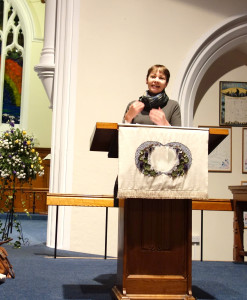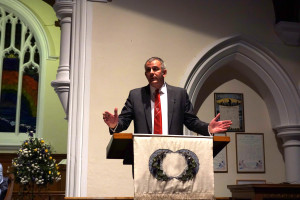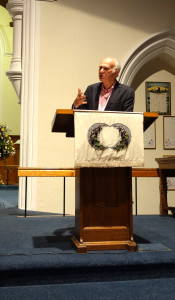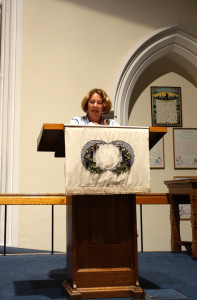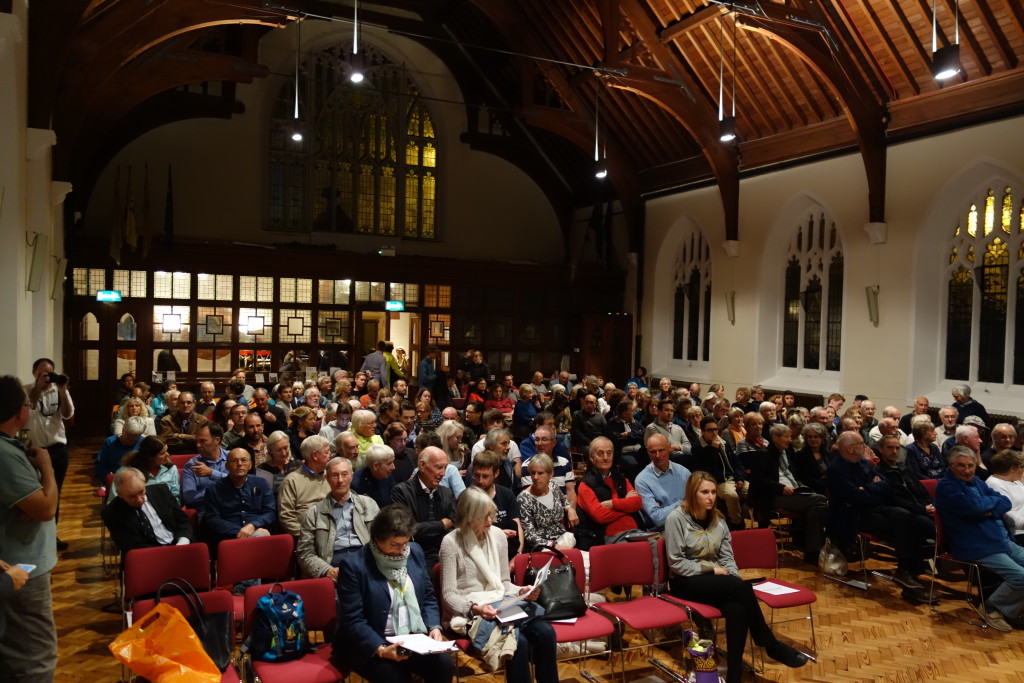Compass volunteer Chuck Dreyer writes about the recent South West Surrey Compass meeting which asked: where now for Progressive Politics?
The growing passion for a new kind of politics was much in evidence in Godalming. Led by the charming and highly effective Steve Williams and his band of volunteers, the South West Surrey Compass branch brought together well over 200 people to explore how progressive politics can bring about a better society.
There can be little to thank Jeremy Hunt for, but his victory in this Tory heartland at the 2015 General Election brought together progressives from various parties, as Susan Ryland, Green Party candidate at the Election, explained. Susan, now chair of the Democratic Deficit Research and Action Group for Compass locally, wanted to give a voice to those whose vote has never counted. Progressives have already worked together locally: both the Liberals and Labour have on occasion stood down in town and borough council elections. With further local elections forthcoming, Susan stressed how essential it is that those with similar policies continue to find ways to cooperate where possible.
Caroline Lucas needs no introduction. Her latest insightful contribution to the progressive cause is The Alternative – co-edited with Lisa Nandy MP and Chris Bowers, a prominent Liberal Democrat – in which many of the themes of progressive collaboration are explored. No one party has a monopoly on wisdom; if we recognise this and put aside our (often minor) differences, we can roll back the tide of privatisation and inequality, protect welfare and the NHS, and take climate change seriously.
Caroline summarized the EU referendum vote as a cry of anger from people who had been ignored for too long as Westminster focused on swing voters in key marginals. In the light of worrying statements at the recent Conservative conference suggesting support for a hard Brexit, there is now a growing sense of urgency. As progressives we must decide: who do we need as MPs? and how do we get them? One option would be a party ‘soft-peddling’ in a particular area; another would be open primaries. Groups such as More United are pushing for a change in the way candidates are supported. But we need to begin these conversations immediately with a sense of openness and a sharing of core values, the first of which, openly shared already by both Greens and Lib Dems, is proportional representation (PR).
More than just a question of principle, PR is increasingly a pragmatic option. There is a sense that Labour is beginning to realise that it will not – cannot – win the next General Election on its own, especially with the upcoming constituency boundary changes, and so electoral reform is back on the agenda. With PR, Labour would be represented in Scotland, and it might have a way back to power.
As always, Caroline brought hope to the debate, and she ended by giving us Roberto Unger’s definition of a progressive as “someone who wants to see society reorganised so that ordinary men and women have a better chance to live a larger life”.
“You were supposed to get Clive Lewis, but he’s a bit busy so you’ve got me instead”: Yorkshireman Howard Kaye tells it like it is (unlike Jeremy Hunt, who denied that a local care home was shutting and instead whined that it was ‘relocating’). Howard was the unsuccessful Labour candidate in South West Surrey last year, and took a while to adjust to the political makeup of this part of the world, having come from Leeds where they used to weigh the Labour vote. But he has also outlived tribalism, making the point that when you join a party, you don’t have to blindly take the party on board. Howard now advocates cooperation, especially perhaps where Tory big-hitters are involved, and sees a progressive alliance as “the only way forward”.
Like Caroline, who began imagining The Alternative at 6am on Election night in Brighton Pavilion with Chris Bowers, Howard experienced a sense of camaraderie with opponent and fellow progressive Susan Ryland as they faced the nauseating prospect of being defeated by the hapless Hunt. But reflecting that Caroline Lucas could have lost, while Vince Cable could have won, Howard is convinced that we need PR: first we win the debate on getting it, and then we find the appropriate system. With 90 or so countries using some form of PR, there’s a pretty good chance that we can make it work.
Vince Cable was rightly introduced as someone who fought for elements of the progressive cause in coalition, as Secretary of State for Business, Innovation and Skills, and who has sought to bring more humanity to politics. Attending his fourth Compass event, Vince began with the stark warning that we are “drifting into a de facto one-party state”, to the extent that even some university socialists see joining the Conservative party as their best route to influence.
Such defeatism is dangerous and must be resisted: “we cannot accept that a functioning democracy operates with one dominant party”. Vince summarised last year’s Election result as the electorate moving to the right, nudged by the slogan ‘Cameron or Chaos’ and terrified of the prospect of Ed Miliband and the SNP; he wryly noted that we no longer have Cameron…
This crisis for the centre-left was highlighted in the Brexit campaign and mirrored across Europe and beyond. Donald Trump was succinctly portrayed as a “sociopathic, misogynist, racist, self-confessed tax-dodger”, but also somewhat indicative of the political tide sweeping Anglo-Saxon countries.
Vince then identified three reasons for the Brexit Out vote: first, Left voters in depressed urban areas who felt abandoned; second, older and more prosperous Mail and Express readers nostalgic for past values and resentful of change; and third, non-European ethnic minorities in places like Leicester who felt that the EU discriminated against them. We must accept the Brexit result, but we can still fight for a soft Brexit, where we keep the basic institutions of the EU, rather than a hard Brexit, where the whole project is jettisoned. Like Caroline, Vince fears we are moving towards the latter, but sees no reason why the 48% should be ignored. A progressive alliance would give voice to this minority, especially younger people who tended to vote Remain.
Turning back to his time in coalition, Vince advocated honesty about the past and more positive rhetoric regarding other parties. He was happy to state that he voted with the Labour government on almost every issue from 1997-2003; that Gordon Brown did not cause the financial crash (see his books for details); and that despite what the left of the Labour party may claim, the last Labour government was a good thing.
Such generosity of spirit was unfortunately not reciprocated, at least not publicly: while several Labour ministers sympathised with much of the Lib Dem project, they were prevented from saying so openly because their own people would never forgive them. Such tribalism must be put aside urgently: in addition to the Brexit crisis, we face an economy that deep down is very weak, a desperate need for public investment, rampant second chamber cronyism, and corrupt party funding where favours are openly bought. But with greater cooperation, we can bring about radical change.
Sue Goss, Labour activist and author of Open Tribe, was clear that Labour will not win in 2020: it is already struggling to appeal to an electorate that has shifted to the right in England but to the left in Scotland. In addition, the E-referendum forced us to hear from people we hadn’t listened to before. So we need something more than PR (under which system the Tories and UKIP combined would have 54% on current polling). What we need is to shift politics itself.
When did you feel happiest? Sue then asked, inviting the audience to close their eyes and reflect for a moment. The answer often contains a tension between those safe moments surrounded by loved ones – Christmas for example – and those times when we strike out in search of something new and thrilling. Such is the balance of tribalism: while it offers a sense of belonging and identity, together with a feeling of safety, as humans we also seek adventure and exploration.
At this point we need to go beyond tribalism and be truly curious, and listen carefully, even to those we do not like or agree with. For “if we think we’re unique, why do we take shortcuts with everyone else?” Winning the argument is stupid, as many of those outside politics have already discovered. Understanding is more important that agreement, which is not essential: instead, maybe we should seek conversations with people who are different, and ask “what could we know that we don’t know?”
The starting point is not an electoral pact but political education. We need to shift how people think, because often the way people think leads them to make inward, defensive decisions. If we can bring about a change in mindset, we can change the world; as Natalie Bennett has said, “the world we live in is neither natural or inevitable’.
Questions from the floor raised a variety of interesting points:
How can we combat media lies with an unfettered press?
How is this movement different from Charter 88?
When the Greens and Labour stood aside in the Farnham local elections for the Lib Dem candidate, how was this explained to the electorate and how was it received?
The referendum result reveals a serious problem of inequality. How would a progressive alliance bring about redistribution of material wealth?
What vision is there of a genuine alternative to the Brexit we are being offered, which does not blame everything on immigration?
To loud applause, the next speaker identified herself as female, a single mother, Quaker, gay and mixed race – and went on to say that in her heart of hearts, she wanted to do unQuakerly things to Out voters…
Whilst the inclusivity of language expressed by the Progressive Alliance is welcome, we must be sure that this applies equally to Tories; we must even hear those people we don’t like as that’s where real connection happens.
In her closing remarks, Caroline Lucas said that Brexit offered us the opportunity for a new narrative. There are no easy labels; we cannot simply dismiss Out voters as racist bigots. We also need to see PR in the Labour manifesto and enable more voices to be heard, rather than focusing on a mere electoral fix.
Howard Kaye regretted that we still have absolute press freedom, but found positive signs in the development of new media, which are potentially more democratic. He apologized for not being able to get PR into the Labour manifesto himself but said that it had given rise to many popular fringe meetings at conference, and that Labour big hitters were beginning to come on board.
Vince Cable said that in response to the lies of the Brexit campaign, we must ensure that the historic record is correct. We must also tackle inequality, as unpopular as that may be – citing John Smith as one of his political heroes, he said that Labour should have won the 1993 Election, but that Smith as Chancellor saying that fairness would mean more tax had not been a popular policy; the Lib Dems likewise suffered at the last Election partly because of their commitment to a Mansion Tax. We need to work with ‘soft’ Conservatives who are equally unhappy with the way Brexit is being mismanaged. Working with Conservatives has been done before: in coalition, the 2 Liberal and 6 Conservative members of Vince’s department had several common enemies, including the Treasury and the Home Office, where Theresa May’s hostility to overseas students was particularly disliked.
Sue Goss said we need to get better at asking difficult questions, the kind of questions to which we would be tempted to answer that we don’t know. At a recent Compass meeting that she chaired, the admission “I voted UKIP!” was met, to her great relief and pride, with the response “Did you? How interesting!” We also need to connect with Corbynistas – (“there can’t be 600,000 Trots!”) – who have brought youth and vibrancy to politics. One-to-one conversations are important, and we must help the BBC liberate itself from the adversarial way it does politics.
And with that, a sizeable crowd for a Wednesday night in Godalming left, we can only hope, resolved to do politics differently.

